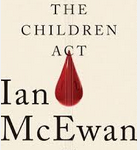 A judge has a role to play, sitting on a bench above the rest of the people in court, passing judgment on the messy results of other people’s life choices. But outside of court judges are people, with spouses, families, apartments, outside interests, and sometimes messy private lives. Fiona Mayes, the protagonist of Ian McEwan’s new novel “The Children Act,” is a High Court judge in the Family Division, responsible for dissolution of marriage, matrimonial proceedings, and proceedings relating to children. She’s used to rendering difficult decisions; one of them, which attracted a great deal of press attention, was whether to separate conjoined twins and cause the death of one, or allow them to die together. Fiona’s not quite as good with her own life. She and her husband, Jack, put off having children as they built their careers that the possibility is now long in the past. As the novel opens, Jack has announced that he would like to render their marriage an open one. Their marriage is cozy and sweet, he says, but “before I drop dead, I want one big passionate affair.”
A judge has a role to play, sitting on a bench above the rest of the people in court, passing judgment on the messy results of other people’s life choices. But outside of court judges are people, with spouses, families, apartments, outside interests, and sometimes messy private lives. Fiona Mayes, the protagonist of Ian McEwan’s new novel “The Children Act,” is a High Court judge in the Family Division, responsible for dissolution of marriage, matrimonial proceedings, and proceedings relating to children. She’s used to rendering difficult decisions; one of them, which attracted a great deal of press attention, was whether to separate conjoined twins and cause the death of one, or allow them to die together. Fiona’s not quite as good with her own life. She and her husband, Jack, put off having children as they built their careers that the possibility is now long in the past. As the novel opens, Jack has announced that he would like to render their marriage an open one. Their marriage is cozy and sweet, he says, but “before I drop dead, I want one big passionate affair.”
Fiona doesn’t want to talk, she has work to do, important work, because a hospital wants to transfuse Adam, a 17-year-old Jehovah’s Witness with leukemia. As she engages with the case Fiona pushes away thoughts of her private life. Her work takes over, and McEwan shows how the work has shaped Fiona’s thoughts, which in turn has transformed her life. Fiona’s had multiple run-of-mill cases, of drug-using parents and neglected children, divorcing couples who’ve seen love turn to hate, and she manages them. It’s a nice scrim against which to view some of the social changes of the late 20th and early 21st centuries. One of Fiona’s more recent cases is a divorce of an ultra-Orthodox Jewish couple, with a related issue of how secular their daughters’ schooling can be. Fiona twits the father, who has used female counsel in his attempt to limit his daughters’ schooling.
McEwan traces Fiona’s thoughts as she makes her various rulings, rendering the difficult legal and emotional issues clear and convincing. But Adam’s case is different for Fiona, and dangerous, because she lets her personal and professional lives cross. It’s a slip, that starts almost innocently, because Fiona wants to see Adam rather than relying on a social worker’s report, so she speaks with him in the hospital. He’s longing for intellectual contact with the wider world, and sees Fiona as his portal. Missing her husband, thinking of the children she might have had, Fiona is in a way seduced by Adam’s need, and connects with him through poetry and music.
The moment sets off a chain of messy consequences, and the novel explores a set of questions – why do we act the way we do? Why might a decision not to act be just as destructive as an action taken? For Fiona, the consequences are weighty, but at the novel’s end she is just beginning her accounting. The forgiveness McEwan suggests is forthcoming seems too easy for Fiona, too quick an ending, a jarring note in a hugely satisfying and deeply engaging novel.
Have a book you want me to know about? Email me at asbowie@gmail.com. I also blog about metrics at asbowie.blogspot.com.


